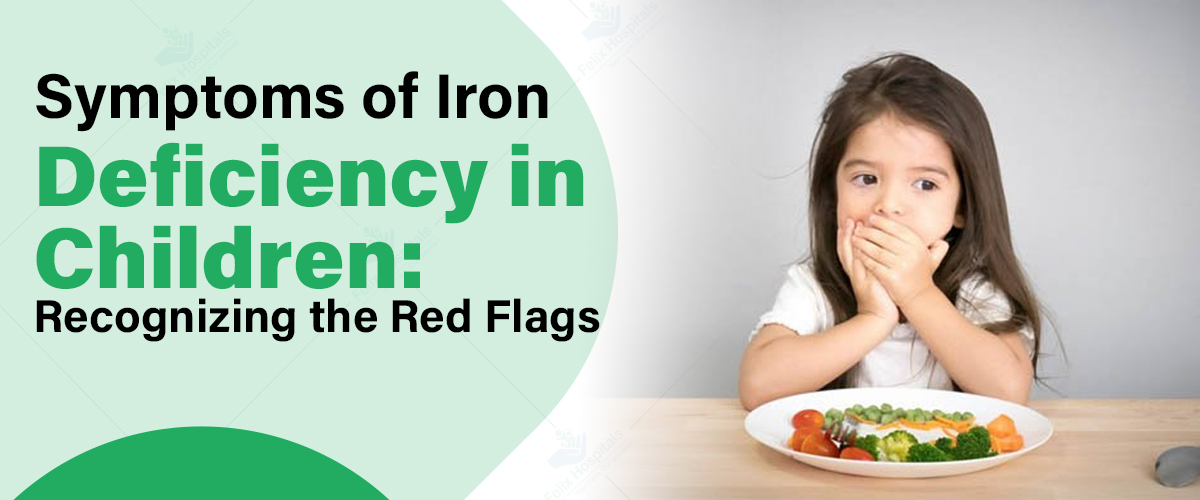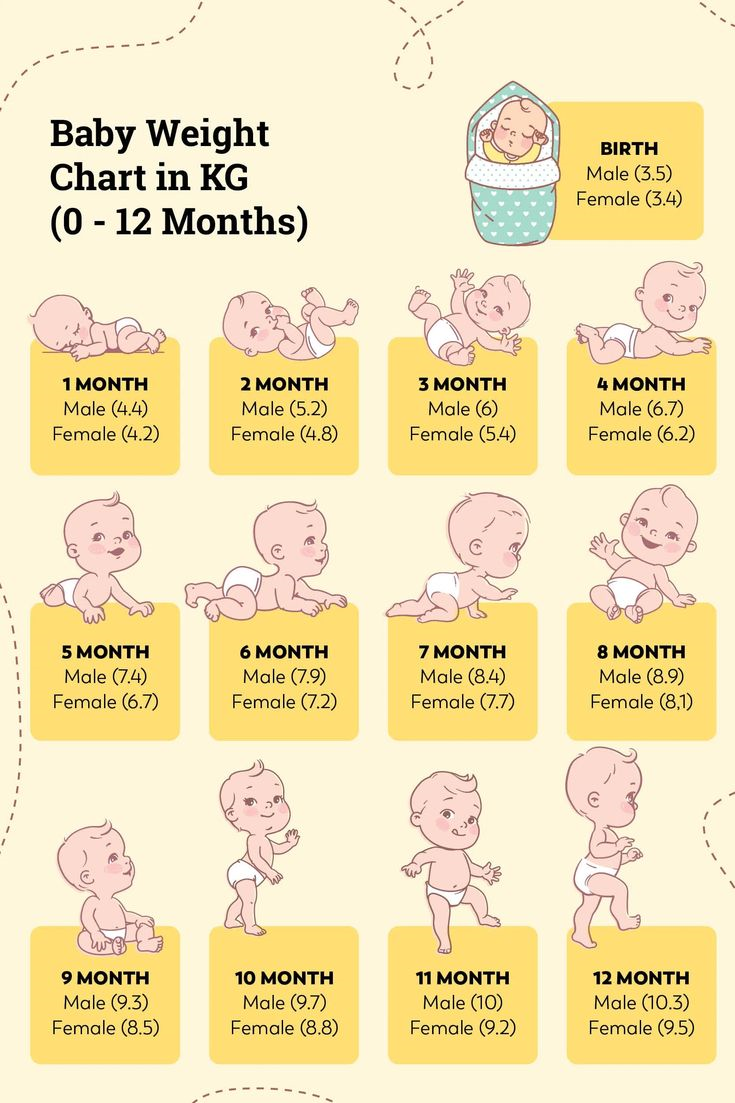Anil Kanojiya
My baby bhuvi get admitted through emergency. Dr. Salil has seen my pt. Initially. I had very good experience here. Also we are thankful to miss neha who helped us providing the bed as per our choice. Thanks felux team.

Iron deficiency anemia is a common health problem in children. If your child is experiencing a lack of energy, it may be due to iron deficiency and requires consultation from your pediatrician. In this blog, we will discuss important topics such as the symptoms of iron deficiency in newborn and what exactly iron deficiency is. To learn more about anemia and receive the best care for your child, visit the best Paediatric Hospital in Noida. Let’s see what our expert pediatrician Dr Vishrut Singh has to say about this.
If your child is suffering from iron deficiency, contact Felix Hospital in Noida at +91 9667064100.
Iron-deficiency anemia occurs when there isn't enough iron in the body. This condition results in a lower number of red blood cells (RBCs) than usual. RBCs contain hemoglobin, a protein that carries oxygen throughout the body. The body needs iron to produce hemoglobin. Without sufficient iron, the production of hemoglobin and red blood cells decreases, leading to anemia.
Iron deficiency anemia may go unnoticed in its early stages because symptoms are often mild or non-specific. However, as the deficiency progresses, it can lead to more pronounced signs and symptoms such as:
- Why: Poor blood circulation and reduced oxygen delivery to tissues can weaken nails.
- Example: Nails becoming fragile, prone to breaking or splitting.
These symptoms can vary in severity depending on the degree of anemia and individual health factors. If you suspect you or someone else may have anemia based on these symptoms, it's essential to consult a healthcare provider for proper diagnosis and treatment.
Dr. Niraj Kumar is a seasoned pediatrician and neonatology specialist with over 11 years of experience. His expertise includes infant and child nutrition, childhood infections, limping child, child development disease treatment, thyroid disease in newborn, growth and development evaluation/management, and vaccination/immunization.
Dr. Prabhat Kumar, with 9 years of experience, specializes in infectious diseases, general pediatrics, and growth and development. He is well-versed in treating various childhood illnesses and teenage health issues.
Dr. Divya Gupta, a pediatrician and pediatric surgeon with 12 years of experience, focuses on thyroid disease in newborn, growth and development evaluation/management, vaccination/immunization, child vaccination, and newborn care. She offers expert consultation for childhood illnesses, immunizations, and vaccinations.
Dr. Vishrut Singh, with over 11 years of experience, is a dedicated pediatrician specializing in diagnosing and treating various pediatric conditions. He provides personalized care and tailored treatment plans to enhance patient health and meet individual needs.
Contact Felix Hospital in Noida today at +91 9667064100 for expert care and treatment.
Iron deficiency anemia in newborns can manifest through a variety of symptoms, often subtle at first but becoming more pronounced as the deficiency worsens. Recognizing these signs early and seeking medical attention is crucial for proper diagnosis and treatment. Maintaining a balanced diet rich in iron and consulting with healthcare professionals can help manage and prevent iron deficiency. If you observe any of these symptoms in your newborn, seek comprehensive care and guidance from the top Child Specialist in Noida.
1.) What happens when your iron is low?
When your iron levels are low, your body can't produce enough hemoglobin, the protein in red blood cells that carries oxygen throughout your body. This can lead to symptoms such as fatigue, weakness, dizziness, shortness of breath, pale skin, brittle nails, and cold hands and feet. If left untreated, iron deficiency can progress to iron-deficiency anemia, a more severe condition that requires medical attention.
2.) How to fix iron deficiency?
To fix iron deficiency, you can:
3.) What drinks are high in iron?
Drinks themselves are generally not high in iron, but some can help improve iron absorption:
4.) How to boost iron immediately?
To boost iron levels immediately:
5.) What food is highest in iron?
6.) How to check iron levels at home?
At-home tests for checking iron levels include:
7.) What is a normal iron level?
Normal iron levels can vary, but generally:
It's important to get tested by a healthcare provider to understand your specific levels.
8.) Are eggs high in iron?
Eggs contain some iron, but they are not considered a high-iron food. One large egg has about 0.9 mg of iron. While eggs are nutritious, other sources like red meat, seafood, legumes, and leafy greens provide higher iron content.
9.) Is 7 iron levels low?
Yes, a serum iron level of 7 mcg/dL is considered very low and indicates iron deficiency. Normal levels range from 60-170 mcg/dL, so a level of 7 mcg/dL would typically be associated with significant iron deficiency anemia and would require medical evaluation and treatment.
Gaining weight is not always a negative thing, but it's crucial to understand the difference between healthy and unhealthy weight gain. A child's digestive system differs from that of adults, and what works for you may not necessarily work for your child, hence it is essential to seek guidance from experts who can provide tailored advice based on your child's specific needs. If you are concerned about your child's weight, you are at the right place. At Felix Hospital, our team of best child specialists in Noida is skilled in guiding parents towards making the right decisions for their child's health. Let’s see what our expert pediatrician Dr Vishrut Singh has to say about this.
Book a consultation now at +91 9667064100 to prioritize your child's health.
Weight gain is crucial for infants because it ensures they receive the necessary nutrients to grow and develop properly. During the first year of life, babies need to gain weight to build strong bones, muscles, and organs. Adequate weight gain helps their brains develop, supporting cognitive abilities and motor skills. It also helps them develop a healthy immune system, which is essential for fighting off illnesses. Additionally, weight gain helps infants maintain a healthy body temperature, which is vital for their overall health and survival. If infants do not gain weight adequately, they may face developmental delays, health issues, and even growth failure, which can have long-term effects on their health and well-being.
Weight gain is crucial for infants, as it ensures they receive the necessary nutrients to grow and develop properly. During the first year of life, babies typically follow a predictable pattern of weight gain:
It's important to note that these are average figures, and individual babies may gain weight at slightly different rates. As long as a baby is consistently gaining weight, even if the figures varies from the averages, it is usually not a cause for concern. Regular monitoring by a pediatrician is key to ensuring healthy growth and development.
Keeping track of your baby's weight gain through regular weigh-ins is a simple but crucial way to stay on top of their overall health and development. Babies should be weighed regularly to ensure they are gaining weight healthily. Here are the general guidelines for weighing your baby:
Birth to 2 Weeks
Newborns are typically weighed at birth and then again within the first few days and weeks of life. This is crucial to ensure they are regaining their birth weight, which is a key indicator of healthy growth. Most babies will be back to their birth weight by around 2 weeks age.
2 Weeks to 6 Months
During this period of rapid growth, it's recommended to weigh your baby once a month. This allows the pediatrician to closely monitor your baby's weight gain and identify any potential issues early on. Consistent weight gain is a sign that your baby is getting the nutrition they need.
6 to 12 Months
As your baby's growth rate starts to slow down a bit, they can be weighed less frequently - about once every 2 months. This continued monitoring helps ensure your baby is steadily gaining weight and developing properly.
Over 12 Months
Once your baby reaches their first birthday, the frequency of weigh-ins may decrease further, as recommended by your pediatrician. However, regular check-ups and growth assessments will still be important to make sure your toddler is on a healthy trajectory.
To get to the root cause, whether it's slow or rapid weight gain in your child, the key is to be proactive in monitoring weight changes, document any patterns, and work closely with your pediatrician or doctor. Here are the key points on what to do if you notice slow or rapid weight gain:
It's crucial to work with your child's doctor to ensure they are receiving the necessary nutrients for healthy growth and development.
Remember, early intervention is key when it comes to addressing any concerns about your child's weight gain. By working closely with your pediatrician and being proactive in monitoring your child's growth, you can ensure they are on a healthy trajectory.
Understanding the factors that influence infant weight gain is crucial for every parent and caregiver. During the early stages of life, a baby's growth and development are intricately linked to various biological, nutritional, and environmental factors. By exploring these factors comprehensively, parents can better navigate the journey of ensuring their baby's healthy growth and development.
Understanding these multifaceted factors can help parents and caregivers better support healthy weight gain in infants and identify any potential issues that may require professional guidance.
Several health conditions can affect weight gain in infants. Here are some common ones:
If parents notice excess weight gain or have concerns about their infant's growth, it's essential to consult a pediatrician promptly. Early identification and management of underlying health conditions are crucial for ensuring healthy development and growth in infants.
Overfeeding infants poses significant risks, including the potential for obesity later in life. Babies have delicate feeding cues that, when overlooked, can lead to overconsumption of calories. Rapid weight gain in the first year, often due to excessive feeding or early introduction of solid foods, can set the stage for obesity in childhood and beyond. It's crucial for caregivers to be mindful of portion sizes and to respond to the baby's hunger and fullness cues rather than relying on external schedules or expectations. Creating a balanced feeding environment early on can help establish healthy eating habits that last a lifetime.
Growth charts are essential tools used by pediatricians to monitor and assess a child's growth and development over time. These charts plot measurements such as weight, length/height, and head circumference against standardized age and sex-specific percentiles, providing valuable insights into a child's health and growth patterns.

For healthy weight gain in children under the age of one, it's essential to focus on nutrient-dense foods that provide necessary calories and nutrients for growth and development. Here are some foods to include in their diet:
Routine check-ups and vaccinations are essential for infants, including those who are overweight under 1 year old. These visits help monitor growth, detect any health issues early on, and provide guidance on nutrition and feeding practices tailored to the child's needs. Vaccinations protect against serious diseases, ensuring the child develops immunity and contributes to community health. Overall, these measures support optimal growth, development, and well-being in overweight infants, offering crucial guidance and protection from a young age.
Seeking professional advice for an overweight child under 1 year of age is important if parents notice :
If you have any other concerns about your child's health or well-being, it's crucial to seek professional advice promptly. Addressing these concerns early ensures that your child receives appropriate medical attention and support, promoting their overall health and development effectively.
Dr. Niraj Kumar brings over 11 years of experience as a distinguished pediatrics and neonatology specialist. His expertise encompasses a wide range of areas crucial to child health, including infant and child nutrition, the management of childhood infections, and treatment for conditions such as limping and developmental diseases.
Dr. Prabhat Kumar boasts over 9 years of experience as a skilled pediatrics and neonatology specialist. His expertise includes the management of infectious diseases, general pediatrics, and monitoring growth and development in children. Dr. Kumar is also well-versed in immunization and vaccination, ensuring comprehensive preventive care for his young patients.
Dr. Vishrut Singh is a highly skilled pediatrician with over 11 years of experience. He specializes in managing all pediatric and neonatal emergencies, including respiratory disorders such as bronchial asthma, wheezing, allergies, prolonged cough, and pulmonary TB. Dr. Singh is also experienced in growth and development assessment and counseling, as well as the diagnosis and treatment of seizures and epilepsy.
Understanding infant weight gain is essential for every parent to ensure their child's healthy development. By monitoring growth patterns, recognizing signs of healthy weight gain versus potential concerns, and seeking timely professional advice when needed, parents can play a pivotal role in nurturing their child's well-being from the very start. At Felix Hospital we understand that each child and their needs are unique, and we stand as the best pediatric hospital in Noida providing personalized guidance and support tailored to their specific needs.
For further queries regarding your infant's growth and development, reach us at +91 9667064100.
1.) What is the normal weight gain period for a baby?
Babies typically gain weight rapidly in the first few months, averaging about 5-7 ounces per week for the first six months. After that, weight gain slows down to about 1-2 pounds per month until age one.
2.) What causes excessive weight gain in infants?
Excessive weight gain in infants can be caused by overfeeding, feeding on demand without regard to hunger cues, offering high-calorie foods too early, or using formula that's too concentrated.
3.) How to stop a baby gaining too much weight?
To prevent excessive weight gain, feed on demand while paying attention to hunger cues, avoid early introduction of solids, offer breast milk or formula exclusively until around six months, and limit sugary or high-calorie foods.
4.) When to worry about baby growth?
Worry if your baby isn't gaining weight, losing weight, or consistently falling behind growth percentiles on their growth chart. Also, if there are developmental delays or concerns about feeding difficulties, consult a pediatrician.
5.) How much does a newborn should weigh ideally?
A newborn's ideal weight varies, but the average is around 2500-4000 gms.
6.) How can parents introduce new foods to their baby's diet?
Introduce new foods one at a time, spaced a few days apart, to monitor for allergies or reactions. Start with small portions and gradually increase. Offer a variety of textures and flavors to develop their palate.
Diarrhea is a condition when one has loose or watery stools or frequent need to empty your bowel. There are two types of Diahrea – Acute, and Chronic.
Acute Diarrhea is common and generally lasts for a couple of days. It can happen due to many reasons like a bacterial or viral infection, travel, food allergy, etc
Chronic Diarrhea is severe and generally lasts for weeks. It usually occurs due to some intestinal disease.
Some of the common symptoms include-
There could be many potential causes of Diarrhea
There are several reasons which can cause Diarrhea, and it is difficult to identify and ultimately prevent it. There are a few precautions that can be taken to avoid it.

Paediatrics & Neonatology is the branch of medicine which helps with the medical care and treatment for newborns, infants, children, and adolescents.
A medical practitioner who specializes in this field is known as Paediatrician. And who further subspecializes in this field are known as neonatologist, who take care of ill and premature newborn (from newborn to 28 days).
At the Felix Hospital Department of Paediatrics & Neonatology (the best children's hospital), we are dedicated to providing exceptional care for infants, children, and adolescents. Our experienced team of paediatricians, neonatologists, nurses, and allied health specialists work together to address the unique needs of each young patient, ensuring they receive the best
| At Felix Healthcare our services include: - | ||
|---|---|---|
| General Paediatrics | Neonatal Care | Intensive Care |
| Adolescent Paediatrics | Neurology | Psychology |
| Paediatric Surgery | Orthopaedics | Psychiatry |
| Pulmonologist | I.D.I | Paediatric Dentistry |
| Growth and Development Paediatrics | ||
Felix Hospitals is the best children’s hospital where critically ill children require specialized, around-the-clock care from expert paediatric intensivists. Our Paediatric Intensive Care Unit (PICU) team is available 24/7 to support these vulnerable patients and provide post-operative care for children who have undergone advanced surgeries. They work closely with paediatric medical and surgical subspecialists to coordinate care, facilitate discharges, and ensure comprehensive follow-up.
Additionally, our PICU is staffed by specially trained critical care nurses who complement the expert medical care provided.
The Neonatal Intensive Care Unit (NICU) at Felix Neonatology Hospital is a specialized intensive care unit that provides world-class care for newborn babies. Our NICU is managed by highly trained, expert neonatologists who specialize in caring for extremely preterm infants as well as newborns with a variety of complex surgical and cardiac issues.
Our NICU is staffed by a dedicated team of expert nurses, physiotherapists, speech therapists, pharmacists, and dietitians, who work collaboratively to deliver comprehensive, individualized care and achieve the best possible outcomes for our tiny patients.
The main aim of Felix (best Children’s Hospital) is to provide comprehensive, end-to-end care for children. We have assembled a team of renowned paediatric subspecialists who offer specialized paediatric care under one roof. These sub-specialists are available for outpatient consultations and also work closely with our specialist paediatricians to manage complex inpatient cases. They are accessible 24/7 for cross-consultations during all paediatric emergencies.
Our paediatric sub-specialists are supported by world-class equipment and facilities, including catheterization labs, EEG and sleep labs, and dialysis units, ensuring that we can deliver the highest level of specialized care.
Our areas of paediatric subspecialty expertise include:
The Department of Paediatric Surgery offers comprehensive diagnostic evaluation and treatment for neonates, infants, children, and adolescents with a wide range of congenital anomalies and acquired conditions affecting the head and neck, chest wall and thorax, abdomen, gastrointestinal tract, genitourinary system, and extremities.
Our team of expert paediatric surgeons performs the full scope of paediatric surgical procedures, including neonatal, thoracic, and abdominal surgeries, as well as paediatric cancer operations. We are also leaders in advanced minimally invasive surgical techniques for infants and children.
Felix Hospitals is the best Paediatric Hospital in Noida. Our areas of paediatric surgical expertise include:
We also specialize in treating health problems in children like Learning Disorder, Sleep Disorder, ADHD, Anaemia, Autism.
1. What does a Paediatric Doctor Do?
Answer: Paediatric doctors, also known as paediatricians, are healthcare providers who specialize in the care of infants, children, and adolescents from birth up to 18 years of age. Their primary responsibilities include:
2. What is the Difference Between Neonatologists and Paediatricians?
Answer: Paediatricians and neonatologists are both medical doctors who specialize in the care of children, but there are some key differences between the two:
i. Scope of Practice:
- Paediatricians provide comprehensive care for children and adolescents from birth to 18 years of age, managing a wide range of health issues.
- Neonatologists are a subspecialty of paediatrics, focusing specifically on the care of newborn infants, particularly those who are premature, ill, or have congenital conditions.
ii. Work Setting:
- Paediatricians typically work in outpatient clinics, private practices, or general paediatric units within Children's hospitals.
- Neonatologists primarily work in neonatal intensive care units (NICUs) and specialized newborn care facilities, providing advanced care for high-risk and critically ill infants.
iii. Scope of Care:
- Paediatricians manage a broad range of health issues, from routine check-ups and immunizations to the diagnosis and treatment of common childhood illnesses and injuries.
- Neonatologists focus on the unique and complex medical needs of newborns, including prematurity, respiratory distress, congenital abnormalities, and neonatal infections, often utilizing advanced medical technologies and interventions.
3. How often should my child see the paediatrician?
Answer: Children should see their paediatrician for well-child visits:
Frequently in the first 2 years of life (every 2-3 months)
Yearly from ages 3-18 years
These routine checkups are important for monitoring growth and development, providing immunizations, and addressing any health concerns. Visit Felix Hospital which is the best newborn hospital and follow the paediatrician's schedule for your child visits to ensure your child's health and wellness.
4. How does your NICU (Neonatal Intensive Care Unit) team manage and care for preterm or critically ill newborns? What are your NICU's outcomes and success rates?
Answer: Our Level III NICU is staffed 24/7 by neonatologists, neonatal nurse practitioners, and specialized NICU nurses. We utilize the latest evidence-based treatments and technologies to provide the highest level of care for preterm and critically ill newborns. Our NICU has consistently achieved excellent outcomes, with survival rates exceeding national benchmarks for premature infants.
5. How does your team approach preventive care and regular checkups for healthy children, including developmental screenings and immunizations?
Answer: Preventive care and routine wellness visits are a top priority for the paediatric department of Paediatric Hospital which is the best child hospital in Noida. We follow the recommended guidelines for well-child check-ups, developmental assessments, and immunization schedules to help keep our young patients healthy and thriving.






Take special care of the health of your kids, especially young children, amidst the changing seasons. Consult a doctor at Felix Hospital immediately if your child under one year has a severe cough, stops taking milk and food, has a high fever, and has diarrhea to avoid future complications.
Child Specialist Doctor in Noida | Paediatrics Specialist in Noida | Best Pediatrician in Noida
The immunity of children is very weak. Therefore they easily catch cough and cold. You can monitor your child at home. Measure the child's breathing rate (respiratory rate) and oxygen saturation (with a pulse oximeter) three to four times a day. Oxygen saturation should be 94% and above.
Pneumonia is the biggest killer of diseases among children in the country. It kills about 25 percent of children. A little carelessness in the treatment of children can become life-threatening.
Some of the common symptoms in the changing weather are:
How Can You Help Your Child From Falling Sick?
Consult a pediatrician near you at Felix Hospital for any problems related to your child.
Call Now at +91 9667064100 or email us at dm@felixhospital.com.
Book an Online Appointment: https://www.felixhospital.com/contact

Every parent wants their child to become a successful, confident, and good human being. A child is like a sponge, which can take any shape and can absorb almost everything they see/learn.
It is important to prepare our children for turmoil, life’s struggles, and failure, so that they are better equipped to face real-world challenges.
1. A reliable environment – Children need to feel that they are protected from the outside world. They should feel safe in the environment they live in. As they grow and develop, they become more sensitive, and their senses are also heightened based on what is around them. They love routines, and it helps them to understand boundaries, etc.
2. Opportunities to grow – A kid will succeed only when given a chance to grow. It is important for kids to experience different things, to be exposed to various things. It can be as small as reciting a poem in front of 10 people, a drawing competition, etc. these activities have given them a chance to explore and learn new things.
Their untapped potential is tested against their skills and comfort zone by giving them opportunities to grow.
3. Connectivity – Children need to feel connected whether in touch, eye contact, or a hug. They find comfort in people that care for them.
When kids feel disassociated from people, they are more insecure and never feel like they belong anywhere.
Emotionally distant adults can give children the illusion that there is something wrong with them, leaving them confused damaging their self-esteem for a very long time.
4. Encouragement – Children need encouraging words and action. A child believes whatever they hear the most. Most of the time, we point to their mistakes, what they haven’t done right instead of what they are good at. The more positive we talk about the child, the more encouraged the child.
The boost we give to children supports who they are. Every word of encouragement and supportive action confirms our belief in that child, as we become their greatest role models.
Last but not least –
5. Problem-solving skills – We as parents often try to fix everything for them, from tying their shoelaces to solving their arguments with their friends to doing their homework, etc. We provide solutions to everything single challenge they face. Though we intend to help them, we do more harm by taking care of everything. Kids should be allowed to fix their problems on their own, to find solutions to everyday issues. They should learn to fail to cherish success.
Consult your child specialist for any queries and health issues at Felix Hospital.
Call Now at +91 9667064100 or email us at dm@felixhospital.com.
Book Your Appointment here: https://www.felixhospital.com/contact

As a child care specialist, I have noticed a huge difference in overall growing of a child in the last 14 years. The kids have not only become mature at an early age but also most of them are obese. The change of lifestyle over a decade is quite visible.
Obesity has become a big problem in Indian kids today.
Child Specialist Doctor in Noida | Paediatrics Specialist in Noida
As per the recent study by “The New England Journal of Medicine”, “India has second highest obese children in the world”. This is actually very scary data.
This made me think what are we leaving our children with?
After discussing this issue for about a year with the parents of children coming to me for consultation. There are four key reasons which came out as a major problem.
Best Pediatrician in Noida | Best Paediatrics Hospital in Noida
Now, we exactly know the problems, but what about the solutions? The solution is simple.
Call Now at +91 9667064100 or email us at dm@felixhospital.com.
Book an Online Appointment: https://www.felixhospital.com/contact

Call Now at +91 9667064100 or email us at dm@felixhospital.com.
Book an Online Appointment: https://www.felixhospital.com/contact

Building healthy habits in the formative years of a child lays the foundation for the healthy living. By teaching them to enjoy healthy eating at a tender age helps for the overall development and growth for life.
So, what as a parent, you should do?
1. EATING BREAKFAST EVERYDAY
Eating breakfast within couple of hours after waking up is the healthiest habit for a child to learn. The first meal helps in setting a day and it also helps in maintaining healthier weight. Wake up your child 10 mins earlier, so that the child has time to eat comfortably. Also, keep a variety of food items each day than just a paratha or bread every day. This way your child would look forward to have a breakfast.
2. TEACH YOUR CHILD TO MAKE INTELLIGENT FOOD CHOICES
Children are inclined towards eating junk food or fast food like chips, burger, pizza, French fries. These food item should be given occasionally or can be given as a reward once in a while for achieving something big or good behavior. Parents should encourage their child to choose food items like fruits, nuts, milk etc.
3. INVOLVE CHILDREN IN DECIDING THE MENU
Taking your child’s input in deciding the menu will make him learn about the nutritional value of food items. It will also make the child feel part of the family.
This way, you can teach your child about different healthy food items, calories etc.
4. MAINTAINING HEALTHY RELATIONSHIP WITH FOOD
Keep a trust on your child if he/she hungry or not. Let your child decide if he/she has eaten enough or not. Do not force your child to eat if he is not hungry.
5. ENJOY THE MEAL TOGETHER
Eat minimum one meal together. Enjoying the meal together as a family plays an important role for overall development. It gives you an opportunity to understand each other, to connect with each other.
Also, try to avoid eating while sitting in front of Television.
6. BE A ROLE MODEL
Children learn from what they see. If you develop healthy habits yourself, the child will follow. Always enjoy and be happy while eating, make good choices when you go out. Set a positive example for your child to follow.
Call Now at +91 9667064100 or email us at dm@felixhospital.com.
Book Your Appointment here: https://www.felixhospital.com/contact
My baby bhuvi get admitted through emergency. Dr. Salil has seen my pt. Initially. I had very good experience here. Also we are thankful to miss neha who helped us providing the bed as per our choice. Thanks felux team.